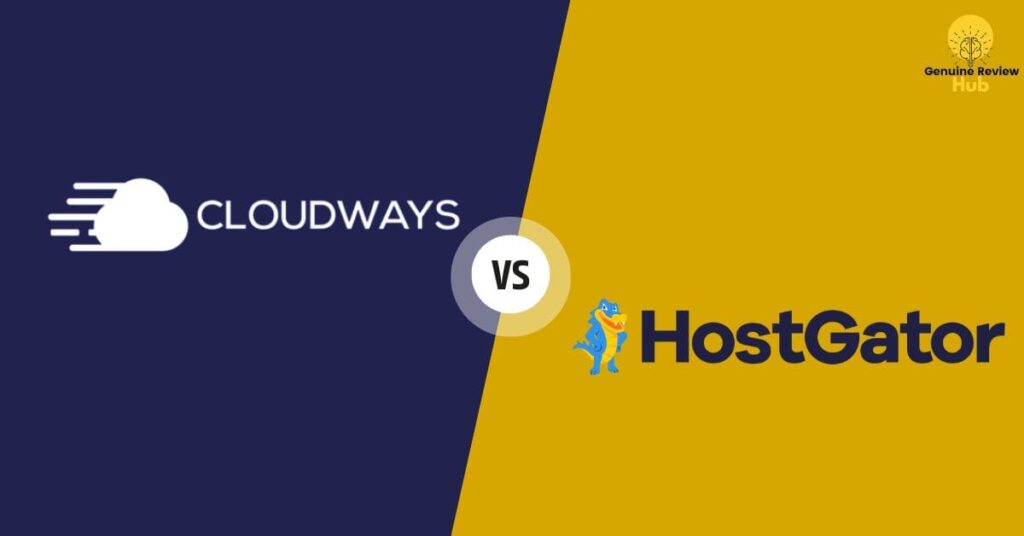In the battle of Cloudways vs. HostGator, the choice ultimately comes down to your specific hosting needs and preferences. If you value simplicity, cost-efficiency, and user-friendliness, HostGator may be the right choice for you. On the other hand, if you require scalability, performance, and a cloud-based infrastructure, Cloudways is the superior option.
Now, let’s delve into the details of Cloudways and HostGator to help you decide which hosting provider is the best fit for your website.
Table of Contents
Cloudways vs. HostGator: Pricing Comparison
When it comes to choosing the right hosting solution, pricing is often a major factor to consider. Let’s break down the pricing structures of Cloudways and HostGator to help you make an informed decision.
Cloudways Pricing:
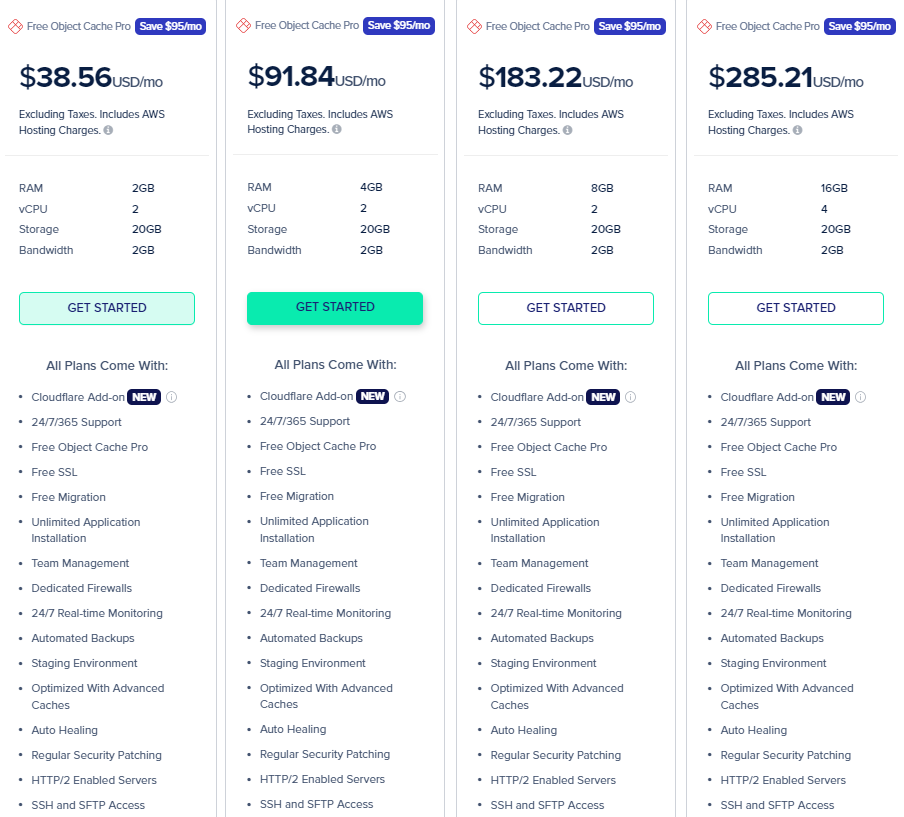
Cloudways offers a unique approach to hosting pricing. They operate on a pay-as-you-go model, which means you only pay for the resources you use. Here are the key aspects of their pricing:
- Cloud Providers: Cloudways partners with industry-leading cloud providers such as AWS, Google Cloud, DigitalOcean, Linode, and Vultr. You can choose the provider that suits your needs and budget.
- Server Types: They offer a variety of server options, including DigitalOcean, starting at $10 per month, and AWS or Google Cloud, which can be more expensive depending on your configuration.
- Scalability: With Cloudways, you can easily scale your resources up or down to match your website’s needs, giving you flexibility and cost control.
- No Long-term Contracts: There are no long-term contracts, so you’re not locked into a plan if your needs change.
Click here to learn more about Cloudways pricing and plans.
HostGator Pricing:

HostGator, on the other hand, follows a more traditional shared hosting model, with different plans to choose from:
- Hatchling Plan: Starting at $2.75 per month, this is the most basic plan and is suitable for hosting a single website.
- Baby Plan: At $3.95 per month, this plan allows you to host multiple websites.
- Business Plan: Priced at $5.95 per month, this plan offers more advanced features and is ideal for small businesses.
Click here to learn more about HostGator pricing and plans.
Conclusion
In the Cloudways vs. HostGator pricing battle, Cloudways offers more flexibility and scalability by providing a pay-as-you-go model and access to premium cloud providers. However, if you’re on a tight budget and need to host a single website, HostGator’s Hatchling Plan may be an attractive choice.
Your choice between these two hosting providers will depend on your specific hosting needs, budget, and the level of control and scalability you require for your website. Make sure to carefully assess your requirements to determine which pricing model aligns with your goals.
Cloudways vs. HostGator: Performance Comparison
Performance is a critical factor when choosing a hosting provider, as it directly impacts your website’s speed, reliability, and overall user experience. Let’s delve into the performance of Cloudways and HostGator to help you make an informed decision.
Cloudways Performance:
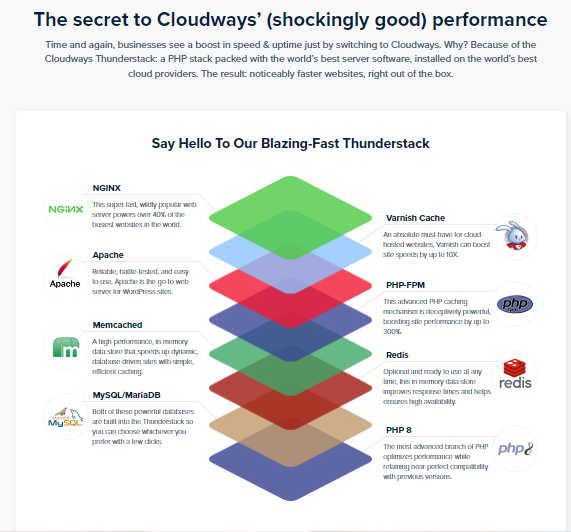
Cloudways shines in the performance department, offering a cloud-based hosting infrastructure that brings several benefits:
- Scalability: Cloudways harnesses the power of cloud providers like AWS, Google Cloud, and DigitalOcean, allowing you to scale resources on demand. This means your website can handle traffic spikes without a hitch.
- SSD Storage: They use Solid State Drives (SSD) for storage, which is significantly faster than traditional HDD storage. This boosts your website’s loading times.
- Content Delivery Network (CDN): Cloudways includes a CDN with their plans, helping to distribute your site’s content across multiple locations, reducing latency, and speeding up page loading.
- Managed Performance: Their team actively monitors and optimizes server performance, ensuring your website runs smoothly.
HostGator Performance:
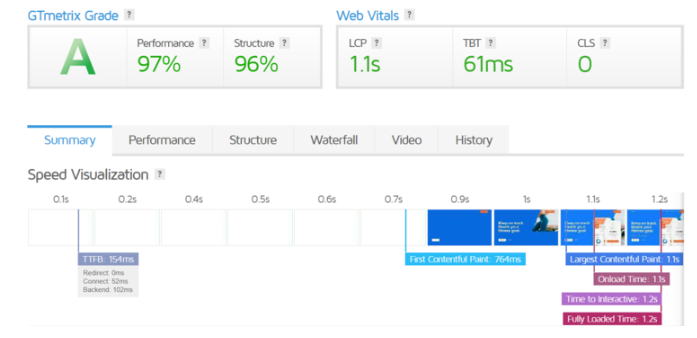
HostGator offers decent performance, especially for shared hosting:
- Shared Servers: HostGator’s shared hosting is cost-effective but might experience performance fluctuations during traffic spikes since multiple websites share server resources.
- SSD Storage (in higher-tier plans): Some HostGator plans offer SSD storage for faster data access. However, this feature may not be available in the basic plans.
- Performance Boost (with higher-tier plans): HostGator’s higher-tier plans come with a performance boost, providing more resources and improved website speed.
Conclusion
In the Cloudways vs. HostGator performance showdown, Cloudways gains an edge due to its cloud-based infrastructure, scalability, and enhanced speed through SSD storage and CDN integration. If performance is a top priority for your website, Cloudways is the clear choice.
HostGator is a suitable option for smaller websites or those on a budget, but it may not deliver the same level of performance, particularly during high-traffic periods. Your decision should be guided by your website’s specific performance requirements and your budget constraints.
Cloudways vs. HostGator: User-Friendliness Comparison
User-friendliness is a pivotal aspect when choosing a hosting provider, especially if you’re not a tech-savvy user. Let’s compare the user-friendliness of Cloudways and HostGator to help you decide which one is right for you.
Cloudways User-Friendliness:

Cloudways offers a user-friendly approach, but it may be more suitable for users with some technical knowledge:
- Control Panel: Instead of traditional control panels like cPanel, Cloudways has a custom control panel. It’s intuitive, but if you’re used to cPanel, there may be a slight learning curve.
- Managed Services: Cloudways provides managed services, taking care of server maintenance and updates, which can ease the technical burden for users.
- Choice of Cloud Providers: While it offers flexibility with cloud provider choice, it also means you need to select a cloud provider and configure your server, which might be intimidating for beginners.
HostGator User-Friendliness:
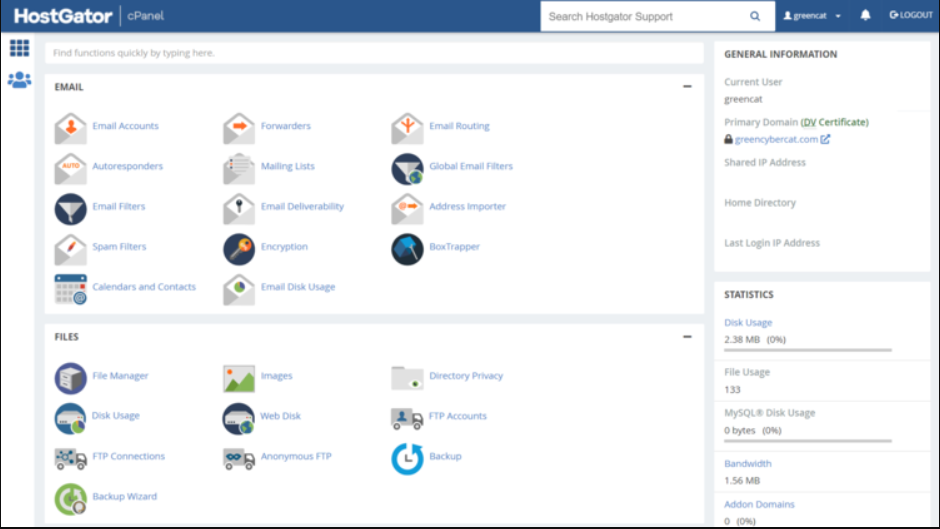
HostGator is known for its user-friendly approach:
- cPanel: HostGator uses cPanel, a widely used and user-friendly control panel that simplifies website management.
- One-Click Installations: HostGator offers one-click installations for popular applications like WordPress, making it easy for beginners to set up a website.
- Shared Hosting Simplicity: Their shared hosting plans are straightforward, making them ideal for beginners who want an uncomplicated hosting experience.
Conclusion
In the Cloudways vs. HostGator user-friendliness battle, HostGator has the upper hand in terms of simplicity, especially with its use of cPanel and one-click installations. It’s a solid choice for beginners and those who want an easy, hassle-free hosting experience.
Cloudways, while not overly complex, may require a bit more tech-savviness due to its custom control panel and the need to choose a cloud provider. However, it offers more control and flexibility, making it suitable for users with some technical expertise.
Your choice should depend on your level of comfort with server management and your preference for a straightforward or customizable hosting experience.
Cloudways vs. HostGator: Security Comparison
Ensuring the security of your website is paramount in the digital age, given the increasing number of online threats. Let’s compare the security features of Cloudways and HostGator to help you make an informed decision.
Cloudways Security:
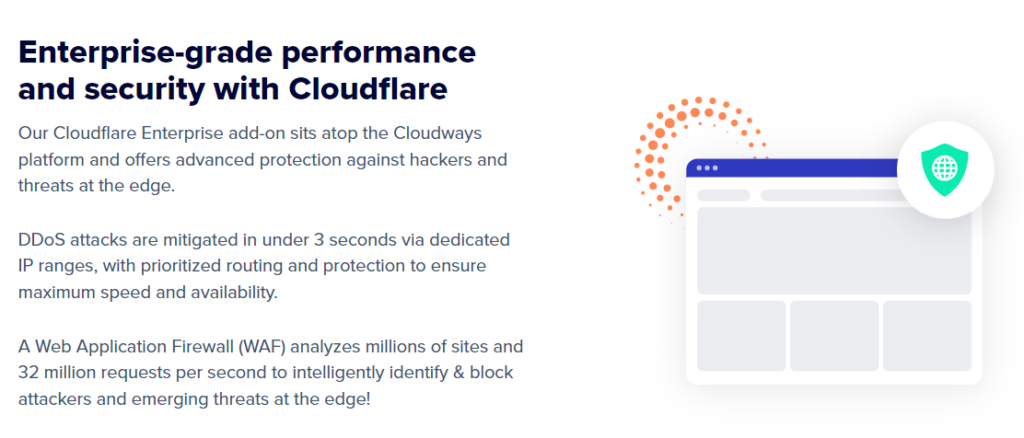
Cloudways takes security seriously and offers several features to safeguard your website:
- Firewalls: They provide dedicated firewalls that protect your website from unauthorized access and malicious attacks.
- Regular Security Patching: Cloudways regularly updates server software and patches vulnerabilities, minimizing the risk of security breaches.
- Two-Factor Authentication (2FA): They offer 2FA, an extra layer of security that prevents unauthorized access to your hosting account.
- DDoS Protection: Cloudways includes DDoS protection, guarding your website against Distributed Denial of Service attacks that can overwhelm servers.
- IP Whitelisting: You can set up IP whitelists to control who can access your website or server, enhancing security.
HostGator Security:
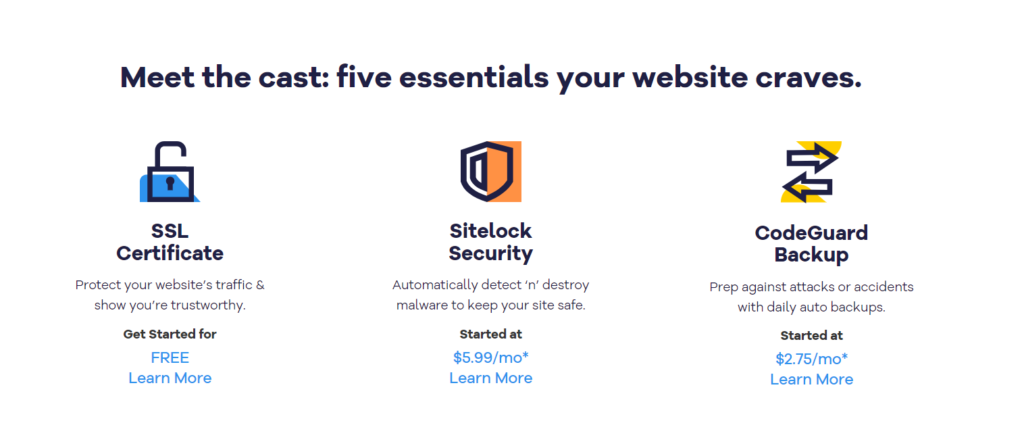
HostGator also provides essential security measures:
- DDoS Protection: They offer DDoS protection on their servers to mitigate the impact of DDoS attacks.
- Hotlink Protection: Hotlink protection prevents others from directly linking to your website’s content, helping to conserve your resources and bandwidth.
- Regular Backups: HostGator includes automatic daily backups, allowing you to restore your site in case of data loss or security issues.
- Malware Scanner: HostGator’s security tools include a malware scanner that helps detect and remove potential threats.
- Secure Shell (SSH) Access: For advanced users, SSH access is available for secure server management.
Conclusion
Both Cloudways and HostGator offer essential security features to protect your website, but Cloudways goes the extra mile with dedicated firewalls, regular security patching, and robust two-factor authentication. These features make it a strong choice if security is a top priority for your website.
HostGator provides solid security features and is a suitable option for users who require basic security measures and the convenience of daily backups. Your choice between the two should be based on your specific security needs and the value you place on enhanced security measures.
Cloudways vs. HostGator: Pros and Cons
Choosing the right hosting provider involves considering both the advantages and disadvantages of each option. Let’s break down the pros and cons of Cloudways and HostGator to help you make an informed decision.
Pros of Cloudways:
- Scalability: Cloudways excels in scalability, allowing you to adapt server resources to your website’s evolving needs.
- Performance: With SSD storage, CDN, and managed services, Cloudways offers excellent website performance.
- Security: Robust security measures, including firewalls and regular patching, enhance the protection of your site.
- Choice of Cloud Providers: You can choose from multiple top-tier cloud providers, giving you flexibility and control.
Cons of Cloudways:
- Technical Skill Needed: Custom control panel and cloud provider choices might require some technical knowledge.
- Pricing Complexity: Pay-as-you-go pricing can be a bit more complex to calculate than fixed plans.
- No Domain Registration: Cloudways doesn’t provide domain registration services, so you need to register your domain separately.
Pros of HostGator:
- User-Friendly: HostGator is known for its user-friendly cPanel and one-click installations, making it ideal for beginners.
- Affordability: They offer budget-friendly shared hosting plans, perfect for small websites and startups.
- Regular Backups: Automatic daily backups ensure your data is safe and easily restorable.
- Customer Support: HostGator provides 24/7 customer support via various channels.
Cons of HostGator:
- Shared Hosting Limitations: Shared hosting may not perform as well during traffic spikes, impacting website speed.
- Limited Scalability: HostGator’s shared plans may not be suitable for large or high-traffic websites.
- Fewer Advanced Features: Compared to Cloudways, HostGator offers fewer advanced features for experienced users.
Conclusion
In the Cloudways vs. HostGator matchup, Cloudways shines in terms of scalability, performance, and advanced security. However, it might require a bit more technical expertise and can be complex to price.
HostGator stands out with its user-friendliness, affordability, and reliable customer support, making it a great choice for beginners and small websites. However, it may not provide the same level of performance and advanced features as Cloudways.
Your decision should align with your specific needs, technical proficiency, and budget. Carefully assess these pros and cons to determine the hosting provider that best suits your website requirements.
Cloudways vs. HostGator: Which Hosting Provider Should You Choose?
Here’s a side-by-side comparison table of Cloudways and HostGator to help you quickly assess the key differences between the two hosting providers:
| Aspect | Cloudways | HostGator |
|---|---|---|
| Pricing | Pay-as-you-go, flexibility in cloud providers | Fixed plans with budget-friendly shared hosting |
| Performance | Custom control panels may require tech skills | Shared hosting with performance limitations |
| User-Friendliness | Custom control panel, may require tech skills | User-friendly cPanel, one-click installations |
| Security | Dedicated firewalls, regular patching, 2FA | DDoS protection, hotlink protection, backups |
| Flexibility | Choice of premium cloud providers | Limited scalability in shared hosting plans |
| Target Audience | Tech-savvy users, businesses with high needs | Beginners, small websites, budget-conscious |
| Customer Support | 24/7 support with different channels | 24/7 support available |
When it comes to the Cloudways vs. HostGator showdown, it’s clear that Cloudways emerges as the superior hosting provider for several key reasons:
- Scalability: Cloudways offers unparalleled scalability, allowing you to adjust server resources as your website grows. This is a game-changer for businesses experiencing varying traffic levels.
- Performance: Cloudways boasts top-notch performance with SSD storage, content delivery networks, and managed services, ensuring fast and reliable websites. HostGator, with its shared hosting model, may struggle to match this level of performance, particularly during traffic spikes.
- Security: Cloudways prioritizes security, providing dedicated firewalls, regular security patching, two-factor authentication, and robust protection against DDoS attacks. These features enhance your website’s safety and minimize vulnerabilities.
- Flexibility: Cloudways lets you choose from a range of premium cloud providers, granting you flexibility and control over your hosting environment.
While HostGator has its merits, including user-friendliness and affordability, it falls short when compared to Cloudways in terms of performance, scalability, and security. If your website’s success relies on these critical aspects, Cloudways is the better choice. It provides the foundation for a powerful, fast, and secure online presence, making it the preferred option for businesses and websites that demand top-tier hosting solutions.

